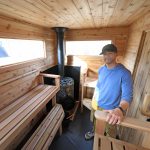City council considers subsidizing Lofts at Basecamp with up to $750,000 in STR funds

John F. Russell/Steamboat Pilot & Today
The Steamboat Springs City Council is weighing a proposal to use short-term rental tax revenues to subsidize 10 apartment units at the Lofts at Basecamp, a move that could quickly convert market-rate rentals into affordable workforce housing.
The plan, discussed at council’s regular meeting on Tuesday, is being positioned as a pilot program — a move city officials hope will provide near-term relief for a community grappling with a housing crisis, especially in the wake of the city’s failed Brown Ranch annexation.
Principal Planner Brad Calvert opened the discussion by clarifying that the council was not yet being asked to appropriate funds, but rather to decide whether the proposal had enough merit to warrant drafting a formal grant agreement.
The Basecamp plan, he explained, was one of three projects recommended by the city’s Ad Hoc Advisory Committee to receive STR tax support, with the Cottonwoods project already awarded funding and a childcare workforce housing initiative up next for consideration.
The mechanics of the proposal are straightforward: the city would offer an operating subsidy of up to $750,000 to the Lofts at Basecamp, owned and operated by May Riegler Properties, over a period of five years so that 10 of its currently market-rate units could be leased at affordable rents to qualifying tenants.
Kevin Riegler, representing May Riegler Properties, in tandem with Calvert, described a flexible approach to both the unit mix and tenant eligibility. The 10 subsidized units would be drawn from whatever became available as tenants moved out, with the possibility of adjusting the mix over time to meet demand.
The “illustrative mix” of units that Calvert presented to council consisted of a single one-bedroom unit at $2,510 market-rate rent, two studios at $1,899 and $1,941, respectively, and seven “studio-light” units — three-bedroom co-living residences — with per-bedroom rents between $1,439 and $1,501.
Initial monthly subsidies from the city, as suggested by Calvert, would be $1,331 for the one-bedroom, bringing rent to $1,179; $883 and $925 for the two studios, bringing rents for both units to $1,016; and between $800 and $862 for the studio-light apartments, bringing per-bedroom rents to $639.
While the initial plan assumes most tenants would qualify at 60% of Area Median Income — a demographic especially difficult to serve in Steamboat’s market — there would be flexibility to accommodate tenants earning up to 100% AMI, and no one would be forced out if their income rose modestly during their tenancy.
Riegler emphasized that the program’s design would allow Basecamp to respond to real-time needs, onboarding units as they became available and adjusting the mix based on which types of units proved most stable and popular. He also noted that while the program would not solve Steamboat’s housing crisis, it could serve as a template for future conversions at Basecamp or other properties, should the pilot prove successful.
Council members probed into the financial structure behind the plan. The city’s annual subsidy would be calculated by determining the “delta” between Basecamp’s market rents and the affordable rents pegged to AMI, with an annual recalibration to reflect changing market conditions.
Administrative costs, such as annual audits and program oversight, would be split between the city and Basecamp, with some eligible for STR tax funding and others requiring support from the city’s general fund.
Other council members echoed concerns about the program’s fee structure.
The proposal tasks the city with paying the $33 application fee per applicant, the $200 fee per move-in and two times the subsidy fee, in the form of a lease break fee, for any tenant who decides to move out without providing 60 days’ notice. This would be in addition to a mandatory $70-75 community fee paid by the tenant, which includes access to the on-site gym.
Councilor Joella West objected to requiring low-income tenants to pay community fees, and suggested the move-in costs be waived, especially given that, according to Riegler, a damage deposit is already in place.
The question of risk was also central to the debate. Riegler acknowledged that vacancy is the primary concern for property owners in such programs, especially when income and local workforce restrictions narrow the pool of eligible tenants. He expressed confidence, however, that Steamboat’s strong demand for affordable rentals would make the program viable, particularly with the housing authority’s involvement in tenant referrals and oversight.
A recurring theme in the discussion was the need to ensure the program truly benefits tenants and the community, not just the developer. Councilor Bryan Swintek argued that the arrangement posed little risk to Basecamp while the city assumed most of the financial exposure.
“We’re giving them a loan and we’re paying them for the privilege of it,” Swintek said, calling for Basecamp to offer additional concessions such as waiving community fees, capping rent increases or providing free parking to ensure the program is a genuine partnership.
Councilor Amy Dickson raised a broader strategic issue, arguing that while the Basecamp proposal is a step in the right direction, the city should develop a comprehensive approach to affordable housing subsidies.
“What I see that we are creating is a voucher program,” Dickson said. “If that’s what we want to do, let’s do it. But right now, we’re doing a one-off. We should actually have a strategy around it where we’re allowing other developers, landlords, to know how to apply, access, whatever that looks like. Someone came up to me and said, ‘Can my landlord do this?’ Probably, but we don’t have a process for that.”
The conversation also touched on the specifics of the units themselves. Several council members questioned the heavy reliance on studio-light co-living units in the property’s options, with Dickson underscoring that these are essentially individual bedrooms within larger apartments.
Riegler explained that these units were designed for individuals or couples rather than families and that the mix reflected both current turnover patterns and the desire to maximize affordability with the available subsidy dollars.
Concerns about the program’s duration ultimately led to an agreement around a two- to three-year pilot, rather than the originally proposed five years. A two-year subsidy would see council paying a total of $225,148, while a three-year subsidy would be $352,393.
“I am 100% behind the concept. I am not at all behind signing up for five years,” said West. “I don’t think it’s going to take five years to prove this concept.”
Council ultimately reached consensus on waiving move-in fees for subsidized tenants, limiting utility costs by tying them to an index and rejecting the idea that the city should pay lease break fees if tenants move out early. They requested Calvert to create a revised draft agreement to be presented at a future council meeting, either through a communication report or the city manager’s report.
For now, the Basecamp proposal stands as a potential test case for the city’s use of STR tax revenues to convert existing market-rate housing into affordable units — a strategy that could be replicated elsewhere if successful.

Support Local Journalism

Support Local Journalism
Readers around Steamboat and Routt County make the Steamboat Pilot & Today’s work possible. Your financial contribution supports our efforts to deliver quality, locally relevant journalism.
Now more than ever, your support is critical to help us keep our community informed about the evolving coronavirus pandemic and the impact it is having locally. Every contribution, however large or small, will make a difference.
Each donation will be used exclusively for the development and creation of increased news coverage.










